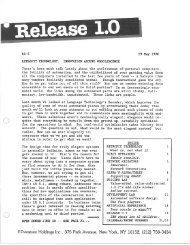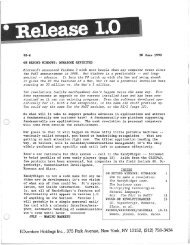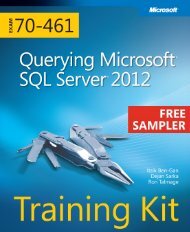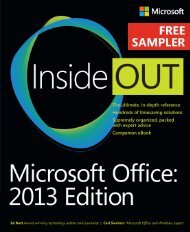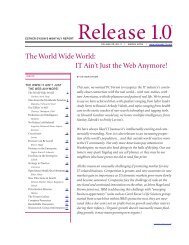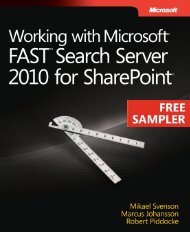MySQL Cluster Tutorial - cdn.oreillystatic.com
MySQL Cluster Tutorial - cdn.oreillystatic.com
MySQL Cluster Tutorial - cdn.oreillystatic.com
You also want an ePaper? Increase the reach of your titles
YUMPU automatically turns print PDFs into web optimized ePapers that Google loves.
This would allow us to make a much simpler query:<br />
SELECT uid, location FROM subscribers WHERE uid = 3<br />
Primary Keys and Unique Indexes<br />
You should define a Primary Key for every <strong>MySQL</strong> <strong>Cluster</strong> table. If you don’t, one will be<br />
created automatically, but that’s considered bad practice.<br />
Both the Primary Key and Unique Indexes will use data and index memory, unless you give<br />
the USE HASH option when you create the table. This way, only the hash part will be created<br />
and no data memory will be consumed. Updating data will be faster, less data memory will<br />
be used, but queries doing range scans might be slower.<br />
Historical Data<br />
Remove redundant even quicker within <strong>MySQL</strong>. Only the data that is hot when you have<br />
lots of changes and new records <strong>com</strong>ing.<br />
Disk-Based Tables<br />
Tables can be created so non-indexed fields are going to disk instead of memory. This will<br />
allow you to store much more data in <strong>MySQL</strong> <strong>Cluster</strong>, but you have to also consider some<br />
possible performance penalty.<br />
One of the reasons why <strong>MySQL</strong> <strong>Cluster</strong> is storing in memory is to <strong>com</strong>pensate for the<br />
possible network latency. Hard drives could possibly add more latency.<br />
You will need to create a ‘logfile group’, and ‘tablespaces’. We are not covering this in the<br />
tutorial, but the <strong>MySQL</strong> Manual has a nice example will get you going. Note that you might<br />
need to configure your <strong>MySQL</strong> <strong>Cluster</strong> to get it actually working well.<br />
Some external links:<br />
http://dev.mysql.<strong>com</strong>/doc/refman/5.1/en/mysql-cluster-disk-data.html<br />
http://johanandersson.blogspot.<strong>com</strong>/2008/12/disk-data-summary.html<br />
Copyright © 2010, Oracle and/or its affiliates. All rights reserved. 70/81





